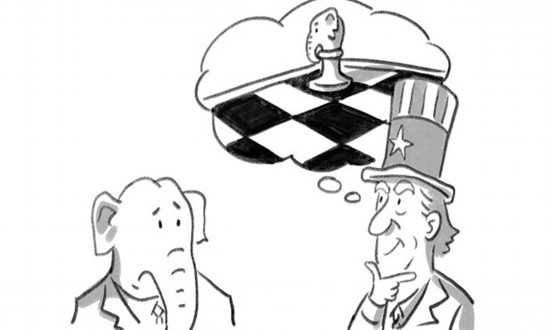Biden's criticism of India's neutrality on Russia exposes US hypocrisy

US-India Illustration: Liu Rui/GT
India's refusal to follow the US' lead in condemning and sanctioning Russia over the Ukraine crisis has increasingly irritated Washington. After White House officials issued warnings to New Delhi on multiple occasions, US President Joe Biden singled out India for its "shaky" response to Russia's military operation against Ukraine while addressing a meeting of US business leaders in Washington Monday.
Biden lauded the US-led alliance, including NATO, the European Union and key allies in the Pacific, especially Japan and Australia, for its "united front" against Russian President Vladimir Putin, but accused India of being "an exception" among Washington's allies and partners.
Not surprisingly, those who have gained a thumbs-up from Biden are blocs and countries often widely regarded as US megaphones and criticized for their lack of independent diplomacy toward the US internationally. The number of such obedient allies is quite limited - all of which seemingly have been named during Biden's Monday speech. In fact, quite a few US allies and partners in Asia and the Middle East such as Turkey and the United Arab Emirates disagree with the US approach of forcing Russia into a corner. India is definitely not the only "exception."
The US wishes to draw India to its side to act against Russia over the Ukraine crisis, which runs counter to India's own diplomatic traditions and practical interests. Since the outbreak of the Russia-Ukraine conflict, New Delhi has adopted a neutral stance and has appealed for peace and constant dialogue. As Prime Minister Narendra Modi put it, India's stand is based on "connections with both Russia and Ukraine." India and Russia have long maintained a close relationship with cooperation in both the defense and security sectors. There is no motivation for New Delhi to serve Washington's interests at the cost of harming its own relationship with Moscow.
As an independent country, India has the right to make diplomatic decisions in line with its own interests and the reality. However, this has become unacceptable for the US.
"It shows the US' deep disrespect for India," said Li Haidong, a professor from the Institute of International Relations of China Foreign Affairs University. A big problem with American diplomacy is its disrespect to other countries and its arrogance in handling relations with other global powers, noted Li.
Disappointments and frustrations were also revealed in Biden's Monday speech. The US has made great efforts to court India in the past, but India has refused to serve as a "hatchet man" in the offensive against Russia. "After all, the US-India relationship is based on expediency," said Li. Unlike unwavering US lackeys like Australia, India hopes to maintain a certain strategic autonomy.
Biden's criticism of India laid bare the hypocrisy of the so-called democratic alliance. If India were to blindly follow US directives, it would be seen as a "like-minded partner," but if it were to do otherwise, it would invite condemnation and would be labeled as an "exception."
But the fact is when it comes to the Ukraine crisis, the US and the puppets it controls are the minority and "exceptions." The majority of countries including India and China support a peaceful resolution to the crisis through diplomatic efforts. They understand the crisis has its historical context, that NATO's eastward expansion led by the US has cornered Russia to counteract, and ruthlessly piling up sanctions on Russia won't help resolve the crisis.
Out of strategic selfishness, Washington has been fanning the flames of the Ukraine crisis and seeking profits. But most countries are not willing to be kidnapped by the US. They know the merits of the issue and where their interests are, and they determine their stance based on these. The true face of Washington has been made clear: It forces allies and partners to take sides regardless of their concerns or interests, which will make those countries become more cautious in developing relations with the US in future. The so-called anti-Russia united "democratic front" cannot be established.
Photos
Related Stories
- Why the number of people incarcerated in private prisons explodes in US
- Rising gasoline prices hit the US hard
- US pardoned Japan’s war criminals in exchange for Unit 731 chemical weapons – how trustworthy is its clarification on Ukraine labs?
- U.S. could miss signs of new COVID-19 surge due to drop in data reporting frequency: NYT
- US is reestablishing a new Inquisition using Russia-Ukraine crisis as excuse
Copyright © 2022 People's Daily Online. All Rights Reserved.










